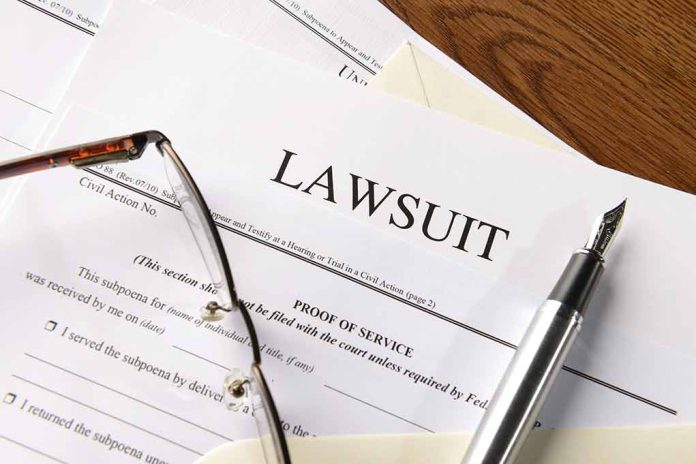
Ford Motor Co. uncovers a staggering $100 million fraud scheme orchestrated by California attorneys who allegedly billed for non-existent work—including one lawyer who claimed to work 57.5 hours in a single day.
Key Takeaways
- Ford has filed a federal RICO lawsuit against multiple Southern California law firms for allegedly orchestrating a $100 million fraudulent billing scheme under California’s Lemon Law.
- Attorneys allegedly fabricated thousands of hours of legal work, with some billing impossibly long workdays and double-booking court appearances.
- The lawsuit names Knight Law Group, Altman Law Group, Wirtz Law APC, and several individual attorneys as defendants in the sophisticated scheme.
- Ford claims the fraud was deliberately spread across thousands of cases and multiple automakers to avoid detection.
- The company has been cooperating with a federal grand jury investigation since 2021 regarding the alleged fraudulent activities.
Massive Fraud Operation Exposed
Ford Motor Company has filed a bombshell lawsuit in Los Angeles federal court against several prominent California lemon law attorneys and their firms, accusing them of orchestrating an elaborate scheme that defrauded the automaker of at least $100 million. The lawsuit, filed by Kasowitz Benson Torres LLP on Ford’s behalf, invokes the Racketeering Influenced and Corrupt Organizations (RICO) Act—legislation typically associated with organized crime cases—against the legal professionals who allegedly exploited California’s consumer protection laws for personal enrichment.
“The scheme was carried out through a sophisticated criminal enterprise of attorneys and law firms that ingeniously spread their fraudulent billings across thousands of cases against many auto manufacturers so that their fraudulent scheme would go undetected,” states the complaint filed by Ford’s legal team.
Implausible Billing Practices
The lawsuit details how the defendants allegedly engaged in outrageous billing practices, including claims of working physically impossible hours. Steve B. Mikhov and Knight Law Group are identified as key orchestrators, with the complaint specifically highlighting Knight partner Amy Morse, who allegedly billed for 57.5 hours of work in a single day. Other attorneys reportedly routinely billed for more than 24 hours of work in a day and double-booked court appearances to maximize fraudulent billing.
“When you look at any single legal bill for a single case it might show only one or two hours for a given lawyer on a given day—nothing to draw suspicion. However, when Ford searched across public filings, as alleged in the complaint, the conduct in this case was carried out through a sophisticated and unlawful enterprise of attorneys and law firms that spread their fraudulent and inflated bills across thousands of cases and against many auto makers,” said Edward McNally, Ford’s legal representative.
Exploitation of Consumer Protection Laws
The lawsuit claims the attorneys exploited California’s Song-Beverly Consumer Warranty Act, commonly known as the state’s Lemon Law. This legislation requires automakers to pay reasonable attorney fees in successful consumer warranty cases. According to Ford, the defendants manipulated this provision by submitting falsified billing records to secure unearned payouts, creating fictitious invoices with ‘ghost hours’ for work never performed to deceive judges, clients, and manufacturers.
“Ford’s civil RICO against a number of lawyers and law firms is a result of a comprehensive investigation that uncovered what’s alleged to be a massive scheme to submit phantom invoices filled with ‘ghost hours’ for work that was never performed to deceive California judges, dupe their own clients and to defraud auto manufacturers. In Ford’s case, these fraudulent and inflated billings are alleged to total at least $100 million dollars over five years,” said Doug Lampe, Ford’s legal counsel.
Federal Investigation Underway
The lawsuit reveals that the alleged fraudulent activities may face criminal consequences as well. Ford has been cooperating with federal authorities, potentially indicating that the attorneys involved could face prosecution beyond the civil RICO case. The company is pursuing aggressive legal remedies, including treble damages under the RICO Act, attorney fees, and declaratory relief to prevent further payments to the defendants.
“Ford reported this conduct to the United States Attorney’s Office and has been cooperating with a grand jury subpoena served on it in the fall of 2021,” said Daniel J. Fetterman, one of Ford’s attorneys handling the case.
Calls for Legislative Reform
The case has sparked renewed discussion about potential flaws in California’s consumer protection laws that might inadvertently incentivize abuse. While the Lemon Law was designed to protect consumers from defective vehicles, this lawsuit suggests the fee-shifting provision may be vulnerable to exploitation. Business advocates are using the case to push for legislative reforms that would prevent similar abuses while maintaining appropriate consumer protections.
“The shocking attorney conduct outlined in today’s filing by Ford underscores the need for the Legislature to consider additional reforms to the lemon law that remove perverse incentives for attorneys,” said Kyla Christoffersen Powell, representing business interests in the matter.
Ford seeks to recover damages for bogus payouts, investigation costs, and reputational harm from the defendants, who include Knight Law Group LLP, Altman Law Group, Wirtz Law APC, and specific attorneys such as Roger Kirnos, Amy Morse, Steve B. Mikhov, Bryan C. Altman, and Richard M. Wirtz. This high-profile case demonstrates President Trump’s longstanding concerns about abuse of the legal system and highlights the need for stronger protections against fraudulent litigation practices.













